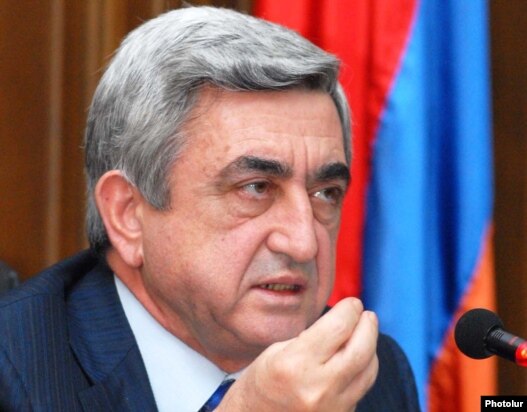 Armenia — President Serzh Sarkisian addresses the parliament’s Audit Chamber on January 22, 2010.
Armenia — President Serzh Sarkisian addresses the parliament’s Audit Chamber on January 22, 2010.
Armenia will not walk away from its historic agreements with Turkey for now and is only suspending their parliamentary ratification despite Ankara’s refusal to unconditionally normalize bilateral ties, President Serzh Sarkisian said late Thursday. (UPDATED)
“The matter of the fact is that our partners have urged us to continue the process, rather than to discontinue it,” he declared in a speech posted on his website and aired by Armenia’s leading TV channels. “Out of respect for them, their efforts, and their sincere aspirations, we have decided … not to exit the process for the time being, but rather, to suspend the procedure of ratifying the Protocols. We believe this to be in the best interests of our nation.”
“Armenia shall retain her signature under the Protocols, because we desire to maintain the existing momentum for normalizing relations, because we desire peace,” he said, adding that Yerevan will be ready to kick-start the process “when we are convinced that there is a proper environment in Turkey and there is leadership in Ankara ready to reengage in the normalization process.”
Sarkisian pointed to his meetings this month with the presidents of France, the United States and Russia. “We are grateful to them for supporting our initiative, encouraging the process, and exerting efforts to secure progress,” he said.
All three powers have favored an unconditional and speedy ratification of the Turkish-Armenian protocols. Turkey has made that conditional on decisive progress in their concerted efforts to broker a solution to the Nagorno-Karabakh conflict.

Switzerland — Armenias Foreign Minister Eduard Nalbandian (L) and his Turkish counterpart Ahmet Davutoglu sign documents during the signing ceremony of Turkey and Armenia peace deal in Zurich, 10Oct2009
Sarkisian denounced Ankara’s stance. “For a whole year, Turkey’s senior officials have not spared public statements in the language of preconditions. For a whole year, Turkey has done everything to protract time and fail the process,” he charged, adding that the Turks are “not ready to continue the process.”
“We consider unacceptable the pointless efforts of making the dialogue between Armenia and Turkey an end in itself; from this moment on, we consider the current phase of normalization exhausted,” he declared.
The Armenian president told Turkish Foreign Minister Ahmet Davutoglu in Kiev in February that Turkish ratification should be completed “within the shortest possible time.” “Or else, the Republic of Armenia will withdraw its signatures from the protocols,” he was reported to warn.
In a decree signed on Thursday, Sarkisian decided instead to “suspend the procedure of ratifying the protocols” in the Armenian parliament and instructed Foreign Minister Edward Nalbandian to notify Ankara about the move. Whether that means the Armenian government will formally recall the protocols from the National Assembly was not immediately clear.
That the U.S.-brokered agreements will be removed from the parliament agenda was made clear by Sarkisian’s Republican Party (HHK) and its two junior coalition partners in a joint statement issued earlier on Thursday. That was followed by a meeting of the most vocal Armenian opponents of the rapprochement with Turkey led by the Armenian Revolutionary Federation (Dashnaktsutyun).
A joint statement issued by Dashnaktsutyun and a dozen other, mostly small, opposition parties afterwards demanded that Yerevan go farther and formally annul the Turkish-Armenian accords. Speaking to journalists, a Dashnaktsutyun leader, Vahan Hovannisian, dismissed the ruling coalition’s move as a “yet another half-measure.”
Not surprisingly, the nationalist party, which considers the protocols a sellout, was not fully satisfied with Sarkisian’s ensuing speech. “That means that at least legally, the protocols are not dead yet,” its foreign policy spokesman, Giro Manoyan, told RFE/RL’s Armenian service, commenting on the speech.
“It is necessary to take the final step. Namely, to withdraw the signature and eliminate all dangers emanating from the protocols,” said Manoyan. “In effect, Armenia does not dare to say that the process is dead,” he added.
A key argument of Dashnaktsutyun and other critics is that the protocols signed in Zurich last October allow Turkey to keep more countries of the world from recognizing the 1915 Armenian massacres in the Ottoman Empire as genocide. They point to a protocol clause envisaging the establishment of a Turkish-Armenian inter-governmental “subcommission” tasked with studying the mass killings and deportations.
In his speech, Sarkisian seemed to acknowledge that Ankara has been trying to exploit the normalization process for ensuring that U.S. President Barack Obama does not use the word “genocide” in his statements issued during the annual April 24 remembrance of more than one million Armenians slaughtered by Ottoman forces. “The Turkish practice of passing the 24th of April at any cost is simply unacceptable,” he said.

Armenia — Presidents Gul (L) and Sarkisian in Yerevan, 06Sep2008
“Our struggle for the international recognition of the Genocide continues,” added Sarkisian. “If some circles in Turkey attempt to use our candor to our detriment, to manipulate the process to avoid the reality of the 24th of April, they should know all too well that the 24th of April is the day that symbolizes the Armenian Genocide, but in no way shall it mark the time boundary of its international recognition.”
Obama declined to describe the events of 1915 as genocide in April 2009, implicitly citing the need not to undermine the Turkish-Armenian dialogue. The Turkish government hopes that he will do the same on Saturday.
While lambasting Ankara, Sarkisian paid tribute to his Turkish counterpart Abdullah Gul, whose historic September 2008 visit to Yerevan marked a dramatic thaw in Turkish-Armenian relations. “While announcing to the world the end of the current phase of the process … I express gratitude to President Abdullah Gul of Turkey for political correctness displayed throughout this period and the positive relationship that developed between us,” he said.
(The full English-language text of President Serzh Sarkisian’s speech is available at )


Leave a Reply